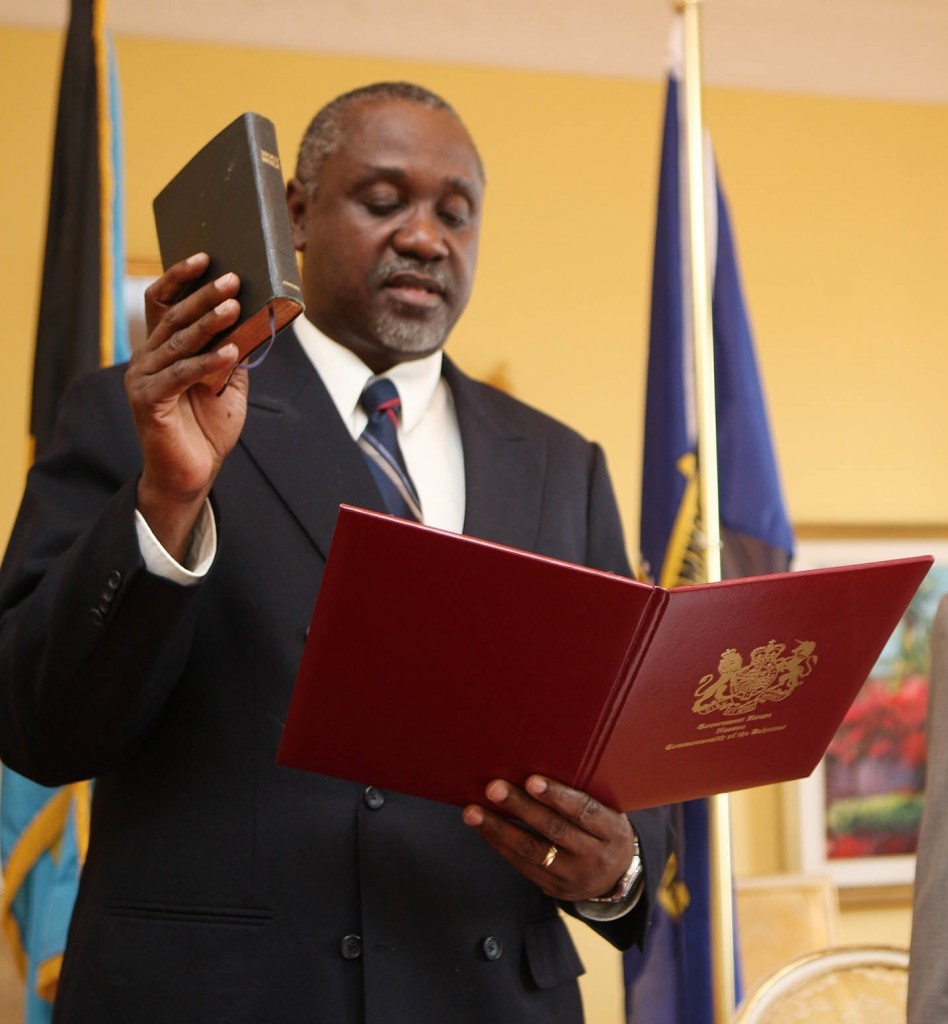
NASSAU, BAHAMAS – There were some interesting commentary from the Chief Justice Sir Hartman Longley during the opening of the Legal Year which went quiet in the press. And while he supports the presented amendments the nation’s jurist shared his deeper legal understanding of the question just edging from getting into the partisan political arena.
This afternoon Bahamas Press publishes Sir Hartman’s comments and leaves the questions open to the floor.
SUPPLIES IN A PORTION OF THE TEXT RELEASED BY SIR HARTMEN LONGLEY AT THE OPENING OF THE LEGAL YEAR 2016:
I turn now to a matter of public Interest
In my capacity as Chief justice I consider I have obligation to make comment on a matter of public importance without descending into the partisan political arena.
There is presently afoot nationally an effort to constitutionally bring equality to Bahamian Women.
Let me say that I unequivocally support the efforts being made to provide legislatively for the equality of men and women before the law. Equality, equal treatment and protection before the law should be a given.
As I listen to the public discourse on the issues, I think it is unfair, for the reasons being given, that Bahamian women and those who support them are finding opposition to legislation, which is primarily intended to level the playing field and correct an historical anomaly.
I say it is unfair because it appears that Bahamian women and those who support them are being asked, in some cases, by their opponents to either guarantee or prove beyond reasonable doubt that the proposed constitutional changes would not lead to the recognition or validation of same sex marriages before they support the bills. No one can give that assurance or guarantee.
Anyone who has traversed constitutional law would know that the legal landscape is littered with examples of language in a constitution when construed broadly and purposively as constitutions are construed, leading to unintended consequences becoming the law, although it may not necessarily lead to them.
We have a number of examples to draw on. What may have been the thinking at inception may well differ when it falls to be considered later on. And sometimes unintended and unforeseen consequences become the law.
Two examples would suffice to make the point and they relate to two common occurrences: bail and mandatory minimum sentences.
I turn first to the example of bail. Most countries try to place some restrictions on the grant of bail by judges and magistrates. This is a quite common occurrence in democracies around the world. The Bahamas is no exception and the debate on bail has raged here for several decades now.
What no one could have imagined in 1973 when the constitution came into being was that Article 2 would have a significant bearing on this question.
That Article provides that The Bahamas shall be a sovereign democratic country.
Even had the officious bystander been asked in 1973 what the word democratic meant in that context he probably would have replied that it was put there to contrast the government of the Bahamas with other autocratic or dictatorial forms of government and that it was intended to be a government of the people for the people and by the people. Nothing more, he probably would not have seen a connection with bail particularly given that article 19 of the Constitution deals specifically with the question of bail.
However, in 2005 in the case of Khyoratti, the privy Council latched on the word “democratic” appearing in the Mauritius constitution in an article of that constitution that is identical to Article 2 of The Bahamas_ Constitution to hold that the attempt by the government of Mauritius to restrict the grant of bail in drug cases was unconstitutional and contrary to Artilcle 2 of their constitution because in a democratic country the grant of bail was a decision that was intrinsically within the domain of the judiciary. In other words it was a judicial function and the executive could not deprive the judiciary of that function in a democratic country without properly amending the constitution.
The Privy Council therefore gave the word “democratic” appearing in the identical provision of the Mauritius constitution a broad and purposive construction, which was probably not in the contemplation of the drafters of the constitution at the time. Few people would have seen a connection between bail and Article 2 as drafted.
To this day therefore, any attempt to restrict the grant of bail collides with this principle.
The second occurrence is the imposition of mandatory minimum sentences. Again because of the disparity that occurs in sentencing especially for serious offences such as drugs and firearm attempts are made to bring a degree of certainty and uniformity to the process by legislating mandatory minimum sentences.
Article 17 of the constitution contains a prohibition against cruel and unusual punishment. Would anyone in 1973 have construed this provision as a hurdle for mandatory minimum sentences? Probably not. But that is what happened in Mauritius in the case of Aubeeluck v Mauritius.
The Privy Council said in 22 a literal reading of Section 7 of the Constitution does not immediately suggest that that is the correct approach to it. The prohibition against subjection “to torture or to inhuman or degrading punishment or other such treatment” might be read to refer to something much more severe than the three years penal servitude in the present case. However, the DPP accepts, in their Lordships’ opinion correctly, that the effect of Section 7 is to outlaw wholly disproportionate penalties.
The end result of this is that all mandatory minimum sentences now must pass a proportionality test before they can apply. Did anyone think that a three year or four year sentence for drugs and firearms would qualify as cruel and unusual punishment for the purposes of Article 17 of the constitution? Was this within the contemplation of the drafters of the constitution in 1973? I think not.
There are other examples to draw on. Because constitutions are construed broadly and purposively, one may have difficulty guaranteeing a particular constitutional result no matter the force of the opinion.
Would the proposed language lead to the result the opponents contend for? I would not venture an opinion at this stage.
However, I would say that in any event, judicial decisions are sometimes reversed by later statutory or legislative interventions.
For this reason, it seems to me to be unfair to delay the efforts to achieve constitutionally equality and equal rights for women.
It is to the law that we must all look for protection and equal treatment. That is the true lesson of Magna Carta. Despotism may arise in many forms.
I unequivocally support the efforts to achieve equality for Bahamian women who have made tremendous contributions to the building of the nation.









